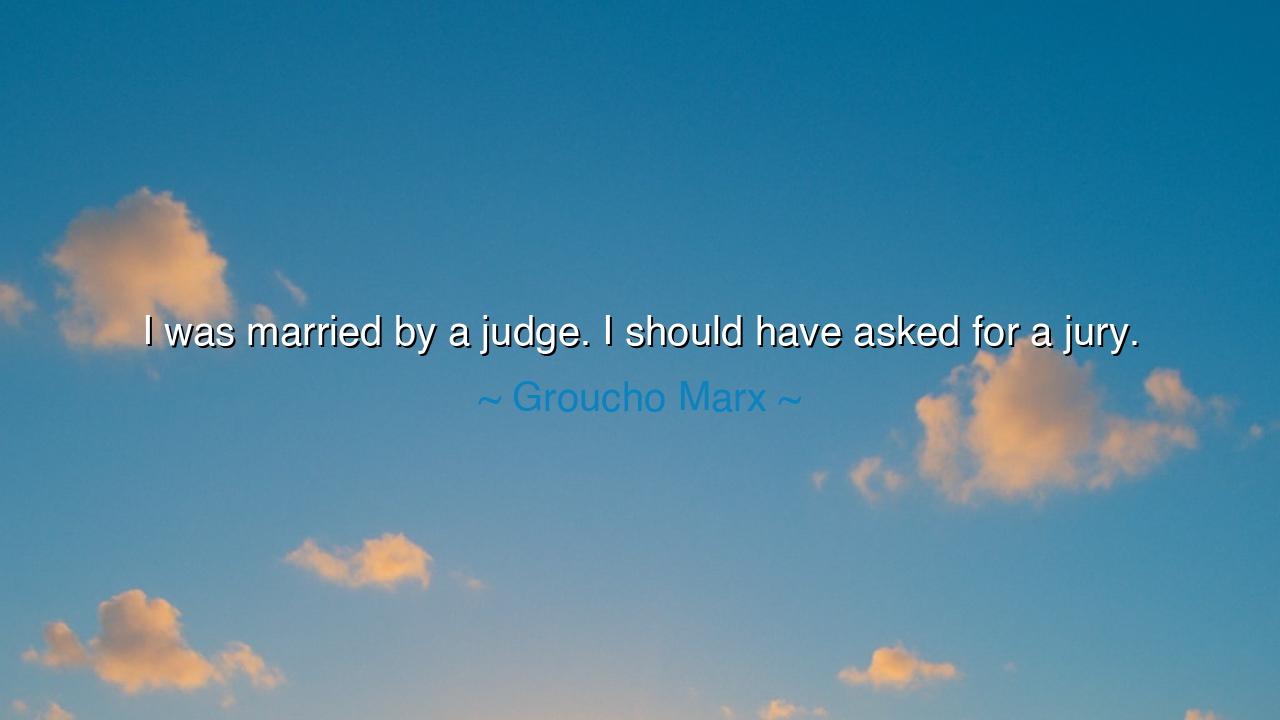
I was married by a judge. I should have asked for a jury.






In these witty and playful words, Groucho Marx reflects on the peculiar intersection of marriage, judgment, and choice. He quips that he was married by a judge, yet immediately laments that he should have asked for a jury, implying that marriage, like law, is a matter deserving broader deliberation and counsel. Beneath the humor lies a subtle truth: the union of two lives is a complex matter, subject to emotion, circumstance, and social expectation, and yet it often proceeds without sufficient reflection or the perspectives of those we trust.
The origin of this remark lies in Marx’s career as a comedian and satirist, where he used sharp wit to reveal human foibles. By casting his own marriage in the framework of a courtroom, he highlights the transactional and socially regulated aspects of matrimony, while also questioning the wisdom of unilateral decisions made in formal settings. The joke resonates across time because it marries comedy with an enduring truth: human institutions—whether law or marriage—often overlook the messy, communal, and emotional dimensions of life.
History offers parallels to this humorous observation. In medieval Europe, arranged marriages were often sanctioned by judges or elders, sometimes without the input of the couple themselves. The decisions, while lawful and socially binding, could leave the individuals feeling as though their personal agency had been subordinated to the authority of the state or community. Marx’s jest reminds us that while legality may secure the form of a union, the true content of love and commitment requires deliberation, consent, and heart.
Marx’s words also reflect on the role of perspective and counsel in life’s most important decisions. A judge represents authority and procedural correctness, but a jury embodies collective wisdom, discussion, and reflection. In marriage, as in law, the perspectives of others—family, friends, and community—can illuminate aspects of choice unseen by one person alone. The humor of his quip lies in the exaggeration, yet the insight is timeless: wisdom is often strengthened through shared discernment.
Ultimately, this quote is a meditation on judgment, reflection, and the human condition. Groucho Marx teaches future generations to approach life’s institutions with both humor and discernment, recognizing the tension between authority and personal agency. Let this wisdom endure: whether in love or law, decisions benefit from deliberation, counsel, and the acknowledgment that the heart, like justice, thrives when it is both free and wisely guided. Even a jest, he reminds us, can carry the weight of profound truth.






TDNguyen Tien Dung
This quote feels timeless because it wraps sarcasm and truth in one neat sentence. I’m curious, do you think jokes like this one contribute to cynicism about marriage, or do they actually make people reflect on its complexities more openly? There’s also the question of intention — was Groucho using humor to protect himself emotionally, or simply to entertain? It fascinates me how one clever line can open such a range of interpretations about love, law, and laughter.
DNMinh Duc Nguyen
I’m intrigued by how this quip merges humor and disillusionment. There’s laughter on the surface, but underneath it might be frustration with the institution of marriage. I wonder, could Groucho Marx be expressing the broader 20th-century sentiment of questioning traditional relationships? What does this say about humor as a coping mechanism — turning potential bitterness into laughter? Can we still find meaning in it today beyond its comedic punchline?
NNhung
This joke hits me with its dry irony — it’s short, sharp, and a bit cynical. I can’t help but ask: does it suggest that marriage is inherently adversarial, like a courtroom battle? Or is Groucho simply mocking the solemnity of marriage ceremonies by framing them in legal terms? Either way, it’s a clever use of wordplay. Do you think this reflects his personal experience with relationships, or just a crafted comedic persona?
TNHuyen Tran Nguyen
I find this quote hilarious but also oddly insightful. It makes me think about how comedians use exaggeration to critique serious institutions like marriage and law. Was Groucho Marx suggesting that marriage is a kind of trial in itself? Or was he just playing with the absurdity of mixing romantic and judicial language? How do we distinguish between lighthearted humor and social criticism in a joke like this?
DDDang Dung
This line from Groucho Marx always makes me wonder about how humor can reflect deep truths about marriage. Do you think jokes like this one reveal underlying skepticism about commitment or the legal aspects of marriage? It’s funny, but there’s a layer of social commentary in it too. I’d love to hear whether you think Groucho was just being witty, or if he genuinely viewed marriage as something one might need to defend in court.